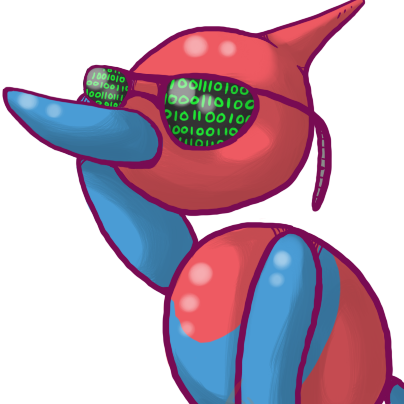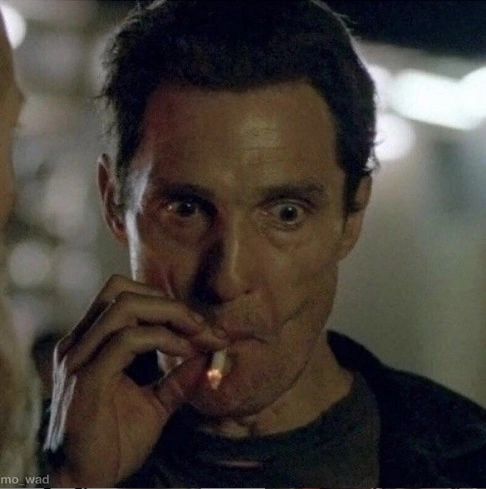Always switch
Jokes on you, I’m a murderer
That’s illegal
Appeal to authority argument
you should still switch then, just switch to the door they opened. then you up your chance of killing from a mere 66% to 100%!
Carl, that kills people
I’ve never understood the logic behind switching.
It might be helpful to extrapolate this out into a higher number of doors. Say there are 10 doors instead of 3, with still just the one prize. So instead of a 33% chance of getting the right answer off the bat, you have a 10% chance.
Now, after making your choice, Monty, being the good guy that he is, opens 8 of the doors that contain no prize, leaving only the door you picked, and one other closed door. Originally, your chance of getting the right door was 10%. However, that’s just because you didn’t know what was behind the other doors. Now, you know what was behind the other doors. Now, the number of doors that could contain the prize has shrunk from 10 to 2.
The prize is definitely behind one of the 10 doors. It could be behind the one you picked at random at the start. But that only occurs 10% of the time. 90% of the time, it’s behind one of the other doors, and Monty has just shown you which of those doors it is by eliminating the other 8 possibilities. So 10% of the time, if you stick with your original choice, you’re going to get a prize. But 90% of the time, you won’t. So it’s way better to switch when given the opportunity.
Does that make it any clearer?
What do you mean prize? This image is about not murdering your fellow humans and nothing more. This explanation only raises further questions!
Thing referenced being the Monty hall problem. Old game show would have a prize and 2 goats behind doors. You pick one then, 1 of the goats were revealed. You get the option to swap your choice
Yes I know, I posted / made the image in OP
So essentially like this:
Original door has 33% chance of being good, compared to 66% chance of the other 2 doors
One of other two doors are opened by Monty, because he’s a swell guy!
The two doors still have a 66% chance of being good, but since one of them is now opened, that 66% chance now only applies to the one other door
Ergo there’s a 66% chance that if you switch doors, you’ll pick the right door
This is a great explanation. I’ve always had a hard time explaining it but I feel like changing it from 3 to 10 makes it way more obvious.
You switch because new information has been added… If the host didn’t reveal what was behind one of the doors, you wouldn’t switch (or do, it wouldn’t matter the chances are the same).
Host shows you something that removes things from the table… And that impacts the probabilities.
ponder on the fact that the host is not just opening one of the doors you didn’t pick at random, they are specifically opening one you didn’t open and that had the inferior prize. this reveals new information. if you did choose one of the two bad prizes initially (a two in three chance, right?), then the one that you can switch to must have the good prize.
Here is an alternative Piped link(s): https://piped.video/TVq2ivVpZgQ
Piped is a privacy-respecting open-source alternative frontend to YouTube.
I’m open-source, check me out at GitHub.
First choice: you have 1 out of 3 chances to get it right
After you pick one, they eliminate another, so the one you currently have chosen is still 33% likely while the last remaining door became 50% likely
Which makes zero sense.
i thought it would be helpful to make a comment on why the probability after switching is 66%, since it’s very counterintuitive. the main reason has to do with why a certain door was chosen to be opened.
in more detail: it helps to instead think about a situation where there are 100 doors, 99 of which have a goat behind them. (original problem was about goats and a car). you choose one of 100 doors. there’s a 1% chance you picked the door with the car. in other words, there is a 99% chance the car is behind a door you did not pick. put differently, 99 times out of 100, you are in a situation where the car is behind a door you did not choose.
afterward you pick your door, the host picks 98 doors with goats behind them and opens them. (this is another crucial detail, the host can only open doors that don’t have a car behind them.) it is still true that 99% of the time, the car is behind a door you did not choose. this is because the doors were opened after you made your choice. but now, there is only one door you did not choose, so that door has a 99% chance of having a car behind it.
Your hypothetical strapped 495 people to train tracks, you absolute monster! Statically, about forty of those 495 have serious chronic back pain, too. You obviously don’t care about the disabled. Be more careful next time when changing the number of doors in a Monty Hall problem!
On the other hand, statistically, the chance of anyone dying is much much lower
I can kind of understand the logic behind it, if you assume your door can’t be affected by the probability of it, but the thing that still stumps me about this is how the probability for your door is “locked in.”
You picked a door out of a set, and by opening any number of doors, the host has altered the set. The other door remaining went from being a 99/100 chance of having a goat behind it to being in a set of 98 knowns, and 2 unknowns. While the host can’t choose it if it has a car, he also can’t choose yours. You wind up with 2 identical doors and X number of open doors, with each door having a 50/50 chance given the re-evaluation.
I know this is supposed to be the wrong answer, but I can’t see why it’s wrong. If you have an explanation, I’d love to finally be able to understand this problem.
It’s because the host has knowledge of the situation. Each door has 1% chance. You lock one door closed that the host can’t touch, goat or car. The other rule for the host is they have to open all of the doors except one and they also can’t open the car.
The door they leave is all possibilities from all doors at the begining minus your door (since the host couldn’t mess with it), which is 1%. Your original choice determined that door would stay closed by the host so the host can’t effect it’s odds with their knowledge. There is only a 1% chance you locked the car behind that door picking randomly. Either you got the 1% and locked the car door or you didn’t. The host will remove 98 goats without random chance and which will leave a car or a goat left. There’s a 99% chance you made them leave the car with your first choice being 1% and a 1% chance you made them leave a goat. It’s still the original odds, but it flips because the host has knowledge and either was forced to removed all possible bad choices and leave the car or you managed to hit the 1/100 chance at the start. There’s a 99% chance you didn’t, so switching has a 99% chance the host left it there.
I think this might have been the answer that helped me the most. Most of all, it’s that the Monty Hall problem isn’t about you, it’s almost entirely about the host’s action of revealing doors.
There’s a 98/99 chance he left that door because it’s the car, or 1/99 because it’s the goat (assuming the one left out of calculation is your door which he can’t choose). Your original choice, whether or not you picked the car, is largely irrelevant. His actions can’t affect your door because he can’t choose it
You’re not betting on a new set of 1/2, you’re not even betting on the door itself having a new probability. You’re betting on the act of the host revealing doors.
deleted by creator
Way easier to explain it this way:
Switching turns a correct guess into an incorrect one, and an incorrect one into a correct one. Your initial guess was more likely incorrect.
I never understood why in the 100-door case, the host opens 98 doors, and not just one door. That feels like changing the rules.
I fully understand the original problem with 3 doors; I know the win probability is 2/3 if you change. But whenever I hear the explanation for 100 doors case, it just makes everything confusing. By opening 98 doors, it feels like the host wants you to switch to the other door. In 3 doors case it’s more natural.
Because the problem is explicitly about the choice between two doors. You have to eliminate all but two choices.
But even then, you’d still have a better chance by switching.
Your intuition about the change is the whole point - it exposes why the result is what it is.
In both cases the host opens every door but one.
Oh hey, it’s that Statistics problem from undergrad I haven’t thought about in over a decade.
First choice had a 33% success chance, second will be 50% let’s switch
after switching the probability becomes 66%. we talked about this one in my theory of probability class, it’s very counterintuitive!
Help a noob out, is that because it’s still 3 but one failure is revealed?
You have Doors “Win” “Lose” and “Lose”
There is a 33% chance to pick a winning door and a 66% chance to pick a losing door.
If you pick one of the losing doors, the other losing door is revealed and switching gives you 100% success. That combines to 100% in 66% of cases.
If you pick the winning door one of the losing doors is revealed, switching gives you a 0% chance of success. That combines to 0% in 33% of cases.
Always switching gives you 66% chance of success overall. Always staying is betting on having picked the correct door when you only had a 33% chance of picking correctly.
For all the pedants out there: the remaining 1% is the chance of summoning the ghost of Monty Hall who then drags you to probability hell. Probably.
Imagine you chose a door, then you are immediately offered to switch your choice to both of the two other doors. If one of the two is the correct one, it will go there automatically and you win.
It should be obvious that switching and betting on two doors is better. But this scenario is actually effectively the same as the original one where a failure door is revealed before you can choose to switch.
looks like i have to teach you all kindergarten level statistics
What kind of kindergarten is teaching the Monty Hall Problem? No wait, what kind of kindergarten is teaching stats?!
Where’s Marylin Vos Savant when you need her?
this never made sense to me till I took a probability class then it clicked lol
I feel like there is some overthinking of the monty problem here. The answer no makes the most sense. Consider this, what is behind the doors is predetermined, right? So either the smallest number of people you can hit is 0 or 5. The most is 10. Chosing either a or c guarentees at least 5 people hit. Choosing B limits the number who can be hit to 5 (if they’re behind the door). So you should always choose B and always keep the choice.
It says “one of the doors you didn’t choose”. So if you choose B, it’s always 0 people.
Overthinking it is exactly what leads to the solution “no” imo. If you say no every time, then you can only possibly be correct 1/3 of the time since it’s a 1/3 chance of picking the correct door. Hence 2/3 of the time you picked incorrectly and hence should switch. By design if you pick incorrectly then the switched door will be the correct solution
deleted by creator
Choose B, door on trolley opens, reveals 5 people, wave at them, leave
deleted by creator












